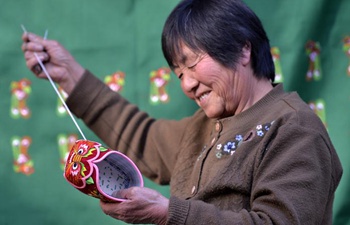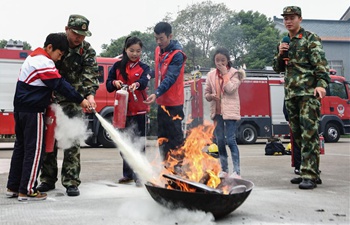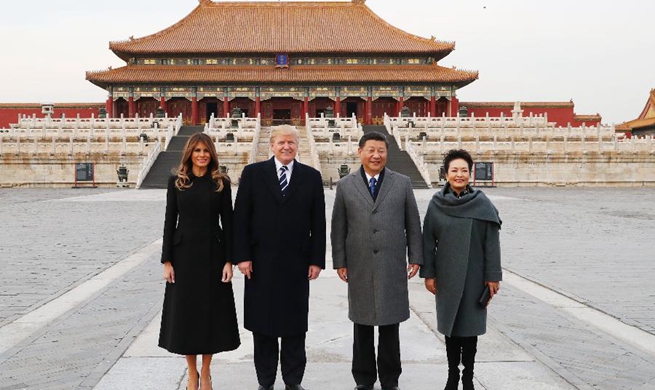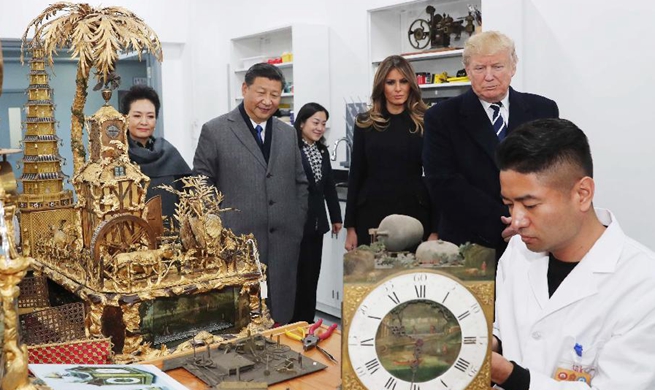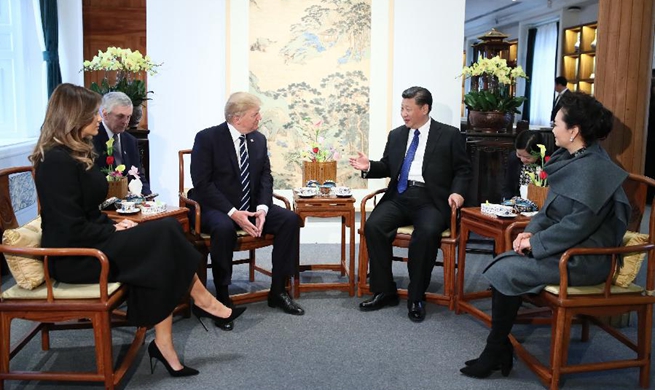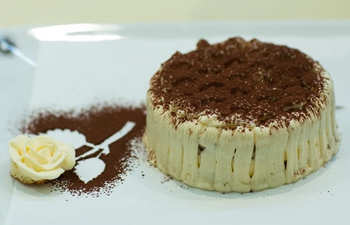NAIROBI, Nov. 8 (Xinhua) -- Banned Kenyan female marathon Olympic champion Jemimah Jelagat Sumgong attempted to seek a reduced two-year ban by admitting to using prohibited substance, recombinant Erythropoietin (rEPO).
Kenya's Sports Disputes Tribunal (SDT) that heard her petition to reduce her international suspension from the sport however, rejected her defence allowing the Anti-Doping Agency of Kenya (ADAK) to slap her with a four-year ban on Tuesday.
Sumgong was provisionally suspended from the sport on April 3 after her urine A-Sample collected at an out-of-competition test conducted on Feb. 28 tested positive for the banned blood booster.
According to the 23-page ruling, the convicted 2016 London Marathon winner claimed she was administered the drug after consulting an unnamed doctor on Feb. 22, 2016, barely six days to the test conducted by IAAF Anti-Doping Officers, at the Kenyatta National Hospital (KNH) in Nairobi.
"The Athlete responded to the Notice from the IAAF stating that she had consulted an unnamed doctor at KNH on Feb. 23 last year for severe bleeding resulting from previous night travel and that she was given a blood transfusion in addition to other unknown medication," the Tribunal ruling stated.
The management of KNH that is the biggest public referral hospital in Kenya however, wrote to the SDT on Jun. 9, 2017 spelling out Sumgong was never treated with rEPO.
"The purported use of Erythropoietin injection is not a standard practice in the management of ectopic pregnancies at the facility and there are no records of the Athlete receiving such injection at the hospital for whatever ailment," the hospital submitted.
Her defence also argued the nature of her ailment "was considered a taboo in her culture and that she feared if she had another ectopic pregnancy it would leave her barren, make her dejected in society and lead to her husband taking on another wife."
Retired athlete and husband, Noah Talam, was Sumgong's coach with the couple shockingly opting not to declare the said hospital visit to KNH on the Doping Control Form dated Feb. 28 as the samples that returned Adverse Analytical Finding (AAF) being the presence of prohibited substance rEPO were collected.
KNH however, acknowledged that Sumgong had visited the Accident and Emergency unit on April 18 almost two months after being alerted of her failed test to see a second opinion concerning treatment for ectopic pregnancy in connection with a surgery that she underwent in Rwanda in 2009.
"However, as this visit was not a medical emergency, the athlete had been advised to seek a follow-up through the hospital's gynaecology outpatient clinic and had therefore, not been prescribed any medication or undergone any procedure on this occasion.
"The hospital has no further record of the athlete attending the facility," the verdict stated as the Tribunal ruled the Feb. 22 letter from KNH as fake.
Sumgong, who was cleared of another doping violation offence in 2012 following the intervention of world governing body IAAF, sought a reduced ban after accepting her provisional suspension.
The Tribunal notes that the Respondent (Sumgong) after being informed of the AAF waived her right to sample B testing since she was of the opinion that both samples were from the same specimen.
"Further, the respondent did not contest the provisional suspension and has not been engaged in any activity related to athletics since the finding was communicated to her. However, these are not sufficient to qualify as 'prompt admission'," the Tribunal ruled in dismissing her application to have a shorter ban.
Under Article 10.6.3 of Anti-Doping Rules ratified by the World Anti-Doping Agency (WADA) Code, an athlete can be granted a reduction on the four-year sanction down to a minimum of two years.
This is based on Prompt Admission if the anti-doping body, upon approval of WADA depending on the seriousness of the violation and the athletes' or other people related to the violation degree of fault.
In convicting her of the doping offence, SDT agreed with ADAK's lawyer, Erick Omariba, that having been spared sanctions in 2012, Sumgong was well advised to avoid prohibited substance use.
Having finished second at the 2012 Boston Marathon, the Kenyan star was cleared in September of that year, on appeal by the IAAF as the local injection which she had received was permitted under the governing body's rules having tested positive banned substance prednisolone.
"He (Omariba) submitted in the light of this, the athlete was aware of the issues of anti-doping and the likely consequences. Further.... the athlete has taken part in a number of high profile races and accordingly, the ADRV (Anti-Doping Rules Violation) would injure the reputation of the country and the Athlete," SDT noted.
The fact that she was among the top athletes who attended an Athletics Kenya (AK) anti-doping seminar in Eldoret where she was pictured holding banners denouncing doping also countered against her defence.
This made her well informed on the perils of doping to the reputation of Kenya and her profession as an elite athlete featuring in big international races with the harsh scrutiny on her country that is still under the IAAF doping watch list.
Sumgong became the second-high profile Kenyan female marathoner after Rita Jeptoo, who is serving a four-year ban having originally been recognised as a three-time Boston and two-time Chicago Marathon champion, to be banned for rEPO use.
In October, five other Kenyan runners, Shieys Chepkosgei, Florence Chepsoi, Joseph Kariuki Gitau, Sharon Ndinda Muli and Ken Kirui banned for doping by ADAK.








